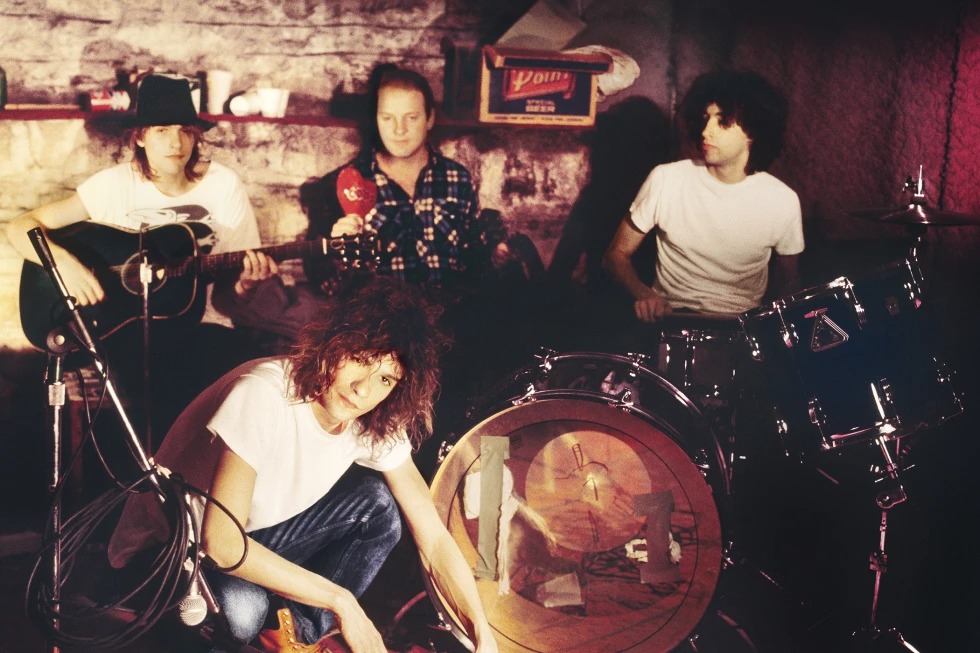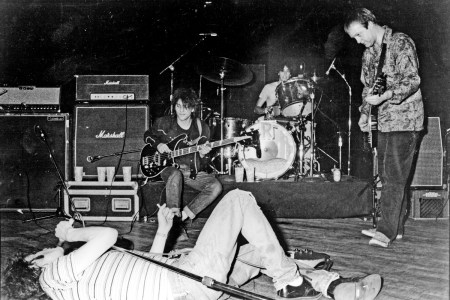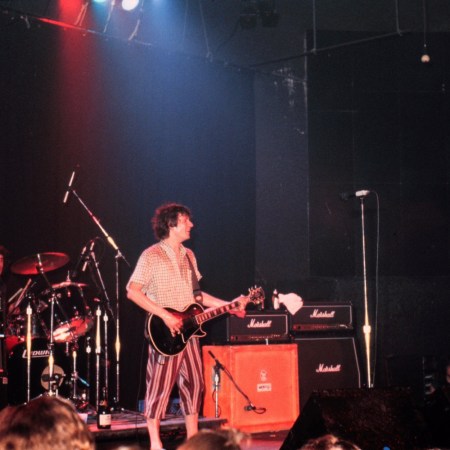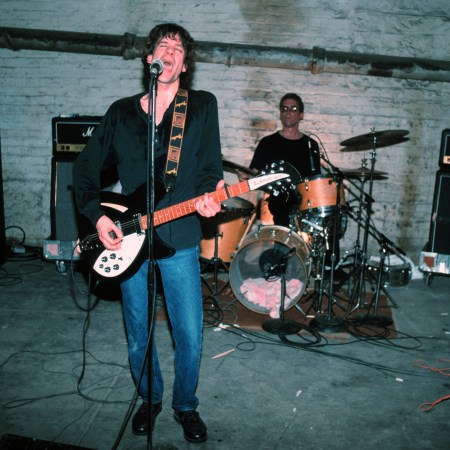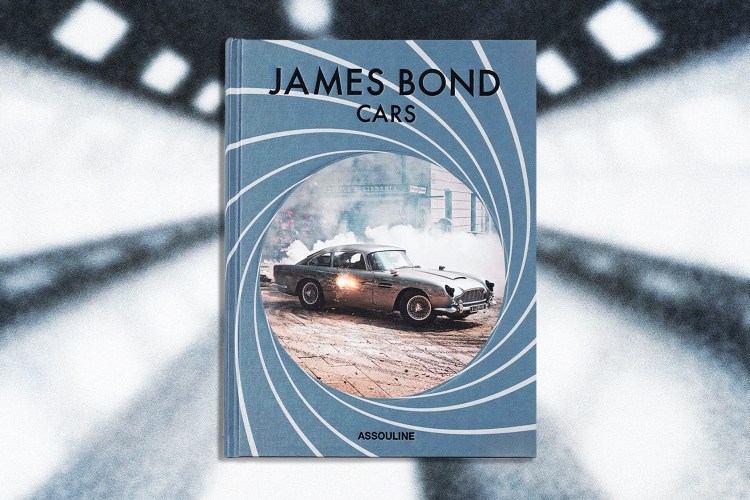One of the fall’s hottest albums is almost 40 years old, and it sounds fresher than ever.
Minneapolis alternative rock legends The Replacements recently released the mammoth box set Tim (Let It Bleed Edition). It contains a live show; the much whispered-about sessions the band did with their hero, Big Star frontman Alex Chilton; and most importantly, a long dreamed-about remix of their 1985 album Tim. The Replacements’ fifth album, and their debut for the major label Sire, has long had a vexed reputation. It’s one of the most beloved albums in the band’s catalog and a cornerstone of alt culture, and it boasts three of the greatest songs a human being has ever written in the form of “Bastards of Young,” “Left of the Dial” and “Here Comes a Regular.” But for most of its existence, it was also one of the worst-sounding greatest albums ever, featuring a strange, dated and reverb-heavy mix from producer Tommy Erdelyi, aka Tommy Ramone.
The project was overseen by Rhino Records A&R man Jason Jones and writer Bob Mehr, whose acclaimed biography Trouble Boys: The True Story of the Replacements, one of the best music books ever written, dove deep into the legend of this famously self-destructive band, peeling away the myths to get at the truth of what made them great, if never as commercially successful as seemed possible. Mehr has also been working as the band’s archivist of late, and has been busy correcting The Replacements’ historical record and adding new dimensions to their story. He helped get For Sale: Live at Maxwell’s 1986, the band’s first official live album, into the world, and then oversaw the release of Dead Man’s Pop, a reissue of the 1989 album Don’t Tell a Soul that included a remix from the album’s original producer Matt Wallace that improved on the overly slick album that mostly underwhelmed fans; Mehr won the Best Album Notes trophy at the 63rd Annual Grammy Awards. He also oversaw a reissue of the 1987 album Pleased to Meet Me, an album that didn’t have the sonic problems of Tim or Don’t Tell a Soul, but it was cool to hear some of the early demos.
But Tim (Let It Bleed Edition) now stands as the crown jewel of this recent wave of Replacements reissues. Featuring a mix from Ed Stasium, who was originally in talks to mix the album, the new version is simply astonishing, the sort of thing that has moved many long-time Replacements fans to tears. (Ahem.) Finally, we know how this album was always meant to sound. The aching, yearning beauty of Paul Westerberg’s vocals shine through with new clarity, as does the band’s musical power. You can finally hear bassist Tommy Stinson, you can get a newfound appreciation for Chris Mars’ steady swing on songs like “I’ll Buy,” and the late Bob Stinson’s molten guitar heroics, previously lost in the mix, are now unapologetically melting faces. (Though the legendarily troubled guitarist was halfway out the door when he cut tracks for the album, the new version of “Hold My Life” should notch him much higher on all future “Best Guitarists Ever” lists.)
The box set has already been called one of the best reissues ever, and it caps off a surprisingly high-profile year for a band that hasn’t toured since 2015, as James Gunn dropped one of the songs into Guardians of the Galaxy Vol. 3, and The Bear dropped three songs into one episode and also featured a scene where Fak debated his favorite ‘Mats album. (I’ve never felt more pandered to by a television episode, and I did not mind.)
I recently talked to Mehr (who, full disclosure, blurbed my book) to talk about the complicated process of bringing Tim (Let It Bleed Edition) to life and what might be next for him and the band.
InsideHook: So, how did you go from The Replacements’ biographer to also being the Replacements’ archivist?
Bob Mehr: Well, actually, the archival part almost started before the biography was out. So I had started work on the book in 2009 officially, although even before that, really. Basically in the course of researching the book, I got access to the Twin/Tone archives and the Warner Brothers archives and I would check things and go through audio and have the luxury of doing that. And even before the book came out in 2015, I kind of met with the band, Paul and Tommy. This was still in the midst of their reunion. We were discussing various kinds of things related to the book, a possible documentary, and then also I had kind of proposed that, “Hey, I’ve been through the archives and there’s a lot of stuff here that could make interesting packages. There’s a lot of unreleased stuff. There’s kind of an alternate view of this band and its history and its recorded history that really seems like it could be a worthwhile thing to create a kind of ideally a series of reissues.” We didn’t know at the time that we’d actually get to do that.
I think the reason I was more involved is that at the time Rhino was in a different state. They’d kind of gotten a little bit out of the reissue business, and The Replacements had lost their longtime A&R guy, Mason Williams. They’ve only really had one catalog campaign, and that was in 2008, which Peter Jesperson, their manager, produced all those and handled them beautifully. But at that point, the viability of the idea of doing something really more expanded and in-depth, we hadn’t proved that. And then I think off the back of the reunion that they did and kind of priming the pump and then the book coming out, it became clear that, yeah, there’s a lot of interest out here. There’s a younger audience for this music in addition to the older audience. And so there might be a possibility of doing something. So initially, before we knew Rhino was really going to be involved and invested and really full-scale back in the reissue business, I kind of actually pitched the project in a slightly different form to independent labels on behalf of the band. But just as that was happening, a new regime came in at Rhino who happened to be filled with Replacements fans, and they kind of really got aggressively back into the catalog business and the reissue business.
And so we started with something we knew was in the can and done in ‘08. There had been some thought of going beyond the album reissues that they did, doing some live stuff and doing some deeper things, and one of the things they’d done was this 1986 multi-track live recording. So I sort of proposed, “Hey, let’s revive this, let’s put this out. This is a band that has such an incredible reputation as live performers, yet there’s never been an official professionally recorded live show released on them.”
There was The Shit Hits The Fans, but that was a bootleg tape that the band put out almost as a goof. And so we put that For Sale: Live at Maxwell’s 1986 out in the fall of 2017. And the reaction was pretty phenomenal, right? Way more than what anybody was expecting and allowed us the luxury to show, yeah, there is an audience for this stuff. So let’s get a little bit more ambitious. And of course, the first project we wanted to do off the bat and off the heat of that was a kind of remix of Don’t Tell a Soul, giving that project back to the album’s original producer, Matt Wallace, to finish, because that had been something that the band really wanted and Paul in particular, and Matt had been sort of lobbying for that opportunity. And so that came out. That was also very successful. And so since then we’ve just been going.
And we did the Pleased to Meet Me reissue, which was kind of probably their deepest collection of studio material. We scaled back on that. That was like a three-disc thing; it didn’t have a live thing. And then when we after that, we took a year off in 2022 and kind of really ramped up with the idea of doing another remix. And really the only two albums the band ever had any sort of qualms with in terms of the mix were the two that they were really most shut out of that process on, and that was Don’t Tell a Soul and Tim.
A New Edition of The Replacements’ “Tim” Has a Very Different Take on “Can’t Hardly Wait”
Does cello make everything better? It just might.The job “band archivist” sounds kind of funny, but it’s actually a real thing. I know Metallica has a full-time archivist, and I believe the Grateful Dead estate does too. So you’re in esteemed company.
The model I follow, just because the work is so excellent, is someone like Andrew Sandoval, who’s a good friend of mine. He was a Monkees fan and biographer [Editor’s note: He is the author of The Monkees: The Day-by-Day Story of the 60s TV Pop Sensation], although he had been involved very early, even as like a teenager in some of the late ’80s reissues, but he’s just done incredible work with their catalog and I think not just in getting stuff out for the fans.
What I think it is, is basically there’s only so many people who have, for one reason or another, spent that much time with bands like The Monkees or The Replacements, and you have this institutional knowledge. And so you get in a position where it’s like, “I don’t want this knowledge to go to waste.” And it really was a thing of like, I got done with the book, but I was still very much interested in the band and I felt almost like I come at it sort of fan first, because I’m a fan first.
I was privy to hearing a bunch of things that the rank and file fans hadn’t heard. And I thought, “Well, how great would it be if they could sort of share the same experience that I had in terms of the research and really hear this stuff,” a lot of which I wrote about. In a way, I kind of selfishly sort of view it as an extension of the book process and as a kind of soundtrack for a lot of the stuff in the book that was discussed but had never been released. And you know, bigger picture, obviously, over the course of whatever the last seven years and five projects, it’s evolved into kind of this other thing. And obviously, if it hadn’t been successful, I don’t think we could have kept doing them. And also in that process, after the first one, Rhino got hired, Jason Jones, who came in as their Replacements A&R man, and sort of partnered with me on this stuff.
And so having somebody at the record company who is as passionate for The Replacements and working hand in hand really makes all this stuff easier. You know, I always say that for a band at The Replacements’ relative commercial level, just in terms of pure sales, you don’t see this kind of a major label devoting the kind of time, money and resources and effort to kind of do these really lovingly curated box sets. You get it from the Beatles and the Stones and bands at that level, of course. So I think that’s a testament to the folks involved on both sides of this. And so I’m happy to kind of be in the middle. I sort of work for the band to a certain extent. I work for the label to a certain extent. I’m an independent coming in as my own kind of thing too. But it’s basically, like I say, it’s just a continuation of this 15-year, 16-year relationship with The Replacements that’s evolved with Rhino.
In 2008 they had the reissue campaign you mentioned, and I remember being blown away by the faster version of “Kiss Me On the Bus.” And that’s when you profiled the band for Spin. That’s kind of when your relationship with them began, right?
I mean, I’ve had years of contact and relationships with, variously, the band and its managers and old managers and people who knew them. I was actually asked in ‘05 to contribute liner notes to the first Tim reissue. So I talked to them for that. And then out of that, I did the Spin story and visited with Paul in Minneapolis and with Tommy in L.A., at the time where he was living. And that really did certainly advance the book process.
Then it was then those years, the ‘08 to ’13 were spent researching and writing the book. And then in ’13 they reunited obviously for a couple of years. And then towards the end of that is when I was getting ready to put out the book, and then we had our meeting in Minneapolis in January of ’15 about various projects, including the idea of doing this campaign. And then Rhino really got going in ’15 again doing reissues. So everything sort of dovetailed perfectly one into the other and the timing was really just right for all this.
Did the band even know how much was in the archives, or did you have to be like “actually guys, there’s a lot more here”?
With the ‘08 reissues that Peter did such an amazing job on them, there was a kind of scope of “these are going to be single-disc things. We’ll have bonus tracks. We’re not going to do live stuff.” And then additionally, once the book was out and we really started talking about doing this, get into the Warner archive a bit more and the Twin/Tone archive, which sort of Peter and his partner Paul Stark sort of have their hands around. But so yes, I was able to probably dig a little deeper than had been done before just by virtue of a few things, including Warner’s archive just getting better organized in that interim. And so, yeah, it was kind of like, here’s all this material, the sound quality, here’s the sourcing, here’s this stuff. And then just getting into the multi-tracks and the master tapes and seeing like, well, what was there and how really how far can we dig into this stuff. It’s an imperfect science, kind of putting these things together. But with the Replacements, I think it was pretty clear we knew that obviously the Don’t Tell a Soul period was, that’s kind of their best-selling album, but probably was their least regarded in a way, just because of the mix, and largely because it was sort of the tail end of the band. It was really the last real band album they made.
And so we thought, once we had this sort of green light and the success of Maxwell’s, let’s really tackle the toughest project first, in a way. Let’s let Matt have a crack at the remix and let’s dig into these famed Bearsville sessions that have never been released, really. So I mean, there was already a pretty clear template of like, “oh, this is just a wealth of stuff here. From a remix to an aborted session to a complete live performance that only four or five tracks have been released.” And then with the other ones, we were kind of getting into individual albums with Pleased to Meet Me and then Sorry Ma. That was, I think, kind of the most epic and the biggest one we did in terms of actual tracks and unreleased tracks and all that stuff.
There’s a lot there.
So then with this one, again, we really wanted to make it about the remix again and focus on that. And so we began that story obviously with Ed Stasium, who in a sense should have and would have and was discussed to be part of the original production team and didn’t do it for one reason or another. And then and there was always, again, some dissatisfaction with that original mix. And over the years there were efforts to kind of halfway correct that. When they did the 2008 reissue of Tim, they did a kind of remastering effort to kind of boost some of the elements, but you can’t really do that. So that didn’t really quite work. And so now we had this track record of success and a record company that was willing to support it. We were able to kind of go whole hog and really mix the album from scratch, which is what it needed. And Ed was really the only choice to do it because of his connection to Tommy Ramone and just his track record of making great-sounding records.
Everything that we’ve done was in one form or another in this original plan that I kind of drew up back in 2015. But it was all a dream at that point. We didn’t know if there would be one thing or kind of truncated versions of these things, so the fact that we’ve really been able to kind of do everything we wanted and then some has been quite surprising and really rewarding, obviously.
What was the actual process like of remixing Tim? Did you have to go back to the original masters?
Actually, it was pretty complicated in the sense that we had the multi-tracks transferred for the whole record and then also for the Alex Chilton sessions that Chilton had done before, because “Left of the Dial” was actually from the Alex Chilton session. So we had to do basically everything that was on the record, mostly the main Tim sessions, but also the Chilton stuff. We just got all the multi-tracks transferred digitally so Ed could work with them in ProTools.
Because I’ve kind of over the years been talking to Paul and Tommy specifically about Tim going back to 2005 and then again all the years I was researching the book. And then subsequent to that as well, we kind of put together essentially a dossier for Ed, kind of notes and background on the record and what happened with it from the band’s perspective and the mix and the things they were trying to do specifically. Like a lot of things having to do with The Replacements, there’s a lot of myths and tall tales and stories, some of them spread by the band around what may or may not happen. So we basically kind of presented Ed with something like, “here’s the story of this record, here’s the band’s perspective on it. Here’s kind of the technical aspects that we’re looking for. Here’s the creative stuff that they were trying to do in the studio, some of which they achieved, some of which they didn’t.”
So basically it was like the band making the record again, essentially with Ed, or at least mixing the record again. And so for Ed’s part, this gets a little technical, but the multi-tracks…it was done in 1985 on a very early computer system, which doesn’t exist and we can’t replicate. So Ed had to first thing go back and kind of make the record again that Tommy had made in terms of just the parts. So for example, like “Bastards of Young” is three different vocal takes and the master is comped from those three. But we didn’t really have the comped master on the multi, so he had to go in and basically figure out, “okay, this is the vocal they used, this is the guitars they used, this is everything they used.” And then he rebuilt the record as Tommy had it just in terms of pure parts and takes. And then he went in and said, “okay, now what can I do to improve the sound, improve the mix?” And then he went in and then looked for stuff that he could add in terms of guitar parts or a little different background vocals.
And so he went in and kind of redid the original record just from a purely technical perspective, and then went in and did his sort of magic in terms of what he wanted to add or change or tweak. Obviously, he had free reign to do what he wanted, but we didn’t want to stray too far and use alternate vocal takes or alternate anything. We worked with the original album and just getting it sounding better, but he was able to sort of plus up some things in terms of finding more of Bob’s guitar or additional backing vocals. And then it was just a question of the mix. As I tell people, there’s a ton of stuff on here that sounds brand new, that sounds like it’s been added, but it was always there on the original mix. It’s just either inaudible or not very audible or lost sort of in the wash of digital reverb that was being used at the time on the original mix. And so it’s…I shouldn’t say a percentage, but it’s basically the original record with some added stuff. But then also fundamentally what is different is the kind of architecture of the mix that Ed came up with in terms of how the drums sound, how the bass sounds, how the guitar separation is.
The original mix was fairly mono sounding. Everything was kind of squished into a wall of sound in the middle of the spectrum and layered or lathered in a lot of reverb that Tommy decided to use. And so just by changing that or taking out that stuff and sort of physically shifting the architecture by splitting up Paul and Bob’s guitars wider in the stereo separation, that changed everything. I would say most remixes are probably a lot easier to do than this and why we were so lucky to have Ed, because he really had a hell of a job in front of him just from a purely technical perspective, and then to add his own sort of creativity and do his own take on the on the mix, it was a whole ordeal because of just the funny period that they recorded this in and the way they did it on an early computer system. I mean, Ed listened to literally every second of tape. So it was like he experienced the making of the record in real time, almost. And he spent many months getting this to where we have it today, which is just an incredible-sounding record.
I remember in your book, which obviously I loved, it explains why Tim sounded the way it did, and that was really eye-opening to me, but it never really occurred to me it could be fixed. So this is such an impressive achievement.
Yeah, we didn’t know until we really got into the multi-track and that was something Jason and I did before, obviously, reaching out to Ed. Because we didn’t know, is all this reverb baked into the master? Is it in the multi-tracks? There was always this thing Paul used to say, I don’t know if it was half-jokingly, that they mic’d one of my amps that was broken, and so are the guitar sounds there? So it wasn’t until we got into just putting up the multi-tracks like, is the raw sound here on tape? And of course they were because at the end of the day, as it turns out, Tommy Ramone produced an incredible record. I mean, you hear these songs and the arrangements, everything is fantastic. And Steve Fjelstad, who was the engineer on the original record, did an amazing job. If Tommy hadn’t produced a great record, if Fjelstad hadn’t engineered an amazing-sounding record, we wouldn’t have been able to do this. So it actually kind of turns out everything was there the whole time. And again, if just for one reason or another stylistic choices or whatever else, it sort of got a little bit lost in the mix. But we’ve been able to rediscover the record that was always there.
This album is really a great example for people that don’t understand how important mixing is or what a mixer really does. This set illustrates what mixing can actually do for an album. The original Tim was still a great album, but Tommy made some strange choices on it.
I mean mixing, like any art form, is subjective, but I think with Don’t Tell a Soul and Dead Man’s Pop, that was really more of a mix to kind of fix…It was almost an editorial mix. There was a lot of period effects that I think kind of obscured what the band was doing. And Matt was able to fix that on Don’t Tell a Soul and return it to its vision because he had been there the whole time producing the record. I think it was more of a sonic corrective and started that way. And then also Ed was able to come in at it with fresh ears and having listened to everything, and was able to say specifically, I think with Bob’s guitar stuff, because Bob basically didn’t track with the band, they cut the album as a three piece, the basic tracks. And then Bob came in pretty late in the session and overdubbed on about half of it, including his solos and stuff. And he just did it in a day. And so I think what happened was the reason why some of Bob’s really good stuff that wasn’t on the original mix got wiped out is natural to understand, from Tommy’s point of view. It’s like they have these tracks and Bob comes in and if he’s laying down all this stuff and he had to let him run wild and just edit it in and down. And I think the natural inclination would be to sort of edit tastefully and and take some things out. And he was correct in a lot of choices. But I think there were some things that I think he threw out the baby with the bathwater a little bit. You know, something like “Little Mascara,” I think there’s some really fantastic and explosive Bob moments, both in the verses and in the solo and the extended outro that we put in.
There’s a lot of complicated reasons why records sound the way they do and certainly why mixes can go the way they do. And The Replacements certainly made this process more complicated than usual or their past records. And so that’s one of the things Ed was able to do is again come at it with maybe more distance and perspective to be like, “oh, well, this stuff that didn’t seem like it worked or seemed excessive in ’85 actually really supports the song and works and now is in this new mix.”
Yeah, it’s incredible. Like right from the first song (“Hold My Life”) we hear a lot more of Bob soloing. It’s kind of just wild to me, that stuff was always there, just hidden in the mix.
A lot of that too is Paul. There’s basically 10 band tracks, and “Here Comes A Regular” is all Paul. The 10 band tracks, Bob’s on half of it, he’s on five tracks. Even something like “Lay It Down Clown,” which was really written for him as a showcase and a workout. He didn’t end up playing on it. That’s Paul playing the slide and the rhythm. But he is where he is on it, stuff like “Left of the Dial” from the Chilton session and “Little Mascara,” “Dose of Thunder,” “Bastards of Young.” There’s little bits and pieces. I mean Ed has gone through and even if it’s stuff that immediately doesn’t jump out at you, it’s almost stuff that should have been there the whole time because it feels so natural within the context of the song. There’s just little bits on “Bastards” that are exactly like that or stuff on “Thunder” where it’s just little fills in between. It was a unique circumstance in terms of how the original record was made. And I think it’s a unique circumstance in terms of how we had to kind of approach the remix or Ed had to approach the remix, but at the end, I think it’s all been for the best because I think now what you get is a record that ultimately is a lot closer to the band’s creative intention. I think that was where the mix got lost. When I say the mix got lost, I think there was a little push and pull between what the band wanted for certain songs and what Tommy wanted.
I mean, Tommy obviously being an experienced, great producer, had a certain vision for things. I think also he had an opportunity in working with The Replacements, that I think freed him from the pretty narrow aesthetic confines of working with the Ramones. I think he had a kind of freedom working with the Replacements that he took. I mean, there’s a lot more reverb on this record than probably all the other records he ever did, you know? So I think he was kind of feeling himself and feeling the opportunity to do something different. Now, whether that ultimately served the band or the record the best, I would argue it probably didn’t, as you can kind of hear. But he was making the record he thought he should make. And I think what we’ve tried to do with this is realize certain conceptual ideas, particularly that Paul had, for the record, something like “Dose of Thunder.” They do this foot-stomping on the board, which goes back to Dave Clark Five or Sex Pistols or Slade. And that was Paul’s idea. Paul being a big Slade fan, that was his idea for the song. And I think him and Tommy had a real push and pull about how much that should be in the mix. Well, now we’ve kind of restored it to more Slade-esque levels, and you can really feel that in the song, and it changes the whole dynamic of things.
“Waitress in the Sky,” I think was conceived as kind of like T. Rex’s “Hot Love,” and now that’s been the best thing, to hear the reactions of people saying, “Wow, it sounds like a T. Rex song now.” And it’s like, “well, yeah, that was kind of Paul’s idea originally for it, you know what I mean?” There’s obviously bigger things like just being able to hear the bass. That was one of the things. The bass was a little out of phase. Ed immediately put that back in phase and it gave it a lot more sharpness and you could really pick it out. So there’s technical things and creative things. And then things of intent, you know, going back to what the band’s intent was on how they wanted this to sound. And that’s not an easy thing to do 38 years after the fact. That’s why I had kind of assembled this kind of notebook for Ed of “Here’s the history of it, here’s what they were thinking at the time, here’s what they were dissatisfied about,” the whole thing, so that he was able to kind of jump right in, into the mindset and into the whole creative process. And then he had to do the really hard work to ultimately go in.
It’s hard for me to pick my favorite moment, but I think today it’s probably Paul’s vocal on “Little Mascara.” But are there any little moments that you can hear now that you particularly love?
Yeah, there’s the stuff that Bob’s doing in “Little Mascara,” just some of the fills in there that, now when you go back and listen to the original, it’s like they’re missing, they should have always been there. That stuff kind of got snipped a little bit in the editorial process or in the mixing process. And it’s so great to hear that stuff back. There’s the humming that Paul does at the end of “Left of the Dial,” which again is on the original recording, is on the original mix. But now you can hear it. He’s just kind of humming the melody as an outro, and it’s a beautiful, really intimate way that’s close to the mic. The way now that Ed has mixed Alex Chilton in “Left of the Dial,” at the outro, that’s Alex singing the harmony part. That’s all Alex. And just to hear that gives me goosebumps.
I think amongst Replacement fans, the song “Nowhere Is My Home” is often considered their best B-side or outtake, and I’ve seen some chatter on Twitter like, why didn’t this all make Tim instead of “Dose of Thunder,” which I do think sounds great here. But do you have any idea why it got left off the album?
You know, I don’t know. I mean, historically, Paul would tend to cycle through songs. I mean, “Can’t Hardly Wait” is kind of the exception of a song that came up more than once. He had a soft spot for it, obviously for good reason because it’s one of the best songs him or anyone else has ever written. But typically they would dispatch material if they couldn’t quite get it right. And I don’t know why they thought… I mean, I think obviously the recording of it that they did with Alex Chilton is really great. I think the new mix that Ed has done just takes it to a whole other level. It’s really quite an unbelievable song. I’d put it in the top tier of anything they’ve done, the new mix. I don’t know if it was a question that they didn’t want to repeat too much stuff that they did with Chilton, although they did redo, I think, “Little Mascara,” if I’m not mistaken. But then they just took the version of “Left of the Dial” from the Chilton session. So I don’t know, it might have been something that, again, kind of got lost by the wayside in some ways.
Look at Dylan, look at how many great songs Dylan leaves off of records.
True.
The great writers don’t always necessarily know their best material or just they’re so creative that they don’t want to linger over something if it’s not quite where they want it to be at that moment.
So the reissue of Don’t Tell a Soul that was Dead Man’s Pop, the critical and fan response, that made it go from “that’s just an okay album” to The Last Great Replacements album, and this reissue is getting universal acclaim. Pitchfork called it “among the best albums ever recorded…ex post facto.” Obviously, the thing with The Replacements, it’s always kind of hung over them that they weren’t commercial champions. This response, how do Tommy and Paul feel about it? Does it kind of make up for being seen as underperformers?
Tommy’s been doing press for this. Paul is basically kind of semi-retired at this point. People like to ask “well, how involved were they in the remix?” I’m like, “Well, obviously we have to have their approval and consent and from concept to execution and they approve everything.”
Tommy’s been outspoken in the round of press, that they finally got a chance to get this one right. I mean, this is even beyond our expectations. We’ve been basically battling it out on Amazon for a week with Taylor Swift and the Rolling Stones for the biggest selling album.
I was talking to Ed just last night. We did this event in LA, a release event, and he was saying, “I’ve had so many people reach out to me saying they were in tears listening to this mix because they know this record and they love this record. But to be able to hear it in this way and with this power has just been overwhelming.” For something like this to happen 40 years later and for it to happen to a band that’s not the Beatles or the Stones and is at the level of The Replacements and for the reaction to be what it is, it’s pretty incredible.
People have already been saying things like “if this album had been released in 1985, they would have had a different career.” But what do you make of the entire “they should have been huge” deal? Because you’ve always avoided that kind of mythologizing.
Listen, there’s so many other factors. Ed says, “I may not have mixed this exactly the same in 1985. The record company may not have let them put out a mix like this in 85.” At this point, The Replacements are huge in their own way. I mean, we were just at an event last night for this release and I tell you, it was probably 50, 60% of the people there were 30 and under,,25 and under, there were kids there, teenagers there, even like with their parents, you know what I mean? So like The Replacements are a successful band by any measure other than the commercial sales in the ’80s. My personal feeling is there were so many other factors that had to do with their not sort of getting to that sort of commercial level back in the day that that really didn’t have much to do with the records. So my feeling is everything worked out the way it was supposed to, you know?
I think from the very beginning, Paul knew that the kind of success they would have wasn’t going to be chart hits in their time, but was going to be a much more kind of timeless success, and slow-growing but permanent. The thing I was thinking last night is watching this audience of young people listening to “Can’t Hardly Wait” and going crazy and listening to these songs, it’s like, “Okay, this is it. They are in the canon now.” And people are going to be listening to this band and this record for a long, long time. They’re not going to be disposable or forgettable or forgotten. And I think that’s the real victory. And that’s the way I look at their success. If that isn’t success, I don’t know what is.
Speaking of younger fans, you might get a kick out of this. A couple of years ago, I interviewed Phoebe Bridgers right when Punisher came out and I asked her about the song “Graceland Too,” and she sings the line “a rebel without a clue.” And she said, “I love Tom Petty, but he stole that lyric from Paul and I’m stealing it back.” [Westerberg used the lyric on the song “I’ll Be You” in 1989 and Petty used it in the 1991 song “Into the Great Wide Open.”]
Well, Paul, I think, might have stolen that lyric from Jim Steinman. I think it was in a Bonnie Tyler song before that. But yeah, no, Phoebe Bridgers actually was produced by Tony Berg, who was the guy who did the Bearsville sessions, the first attempt at Don’t Tell a Soul for the Replacements. And I remember actually when Don’t Tell a Soul came out, we got her a copy of that box set and the jacket and everything in all the merch. So, yeah, she’s, I think she’s a fan and certainly through Tony, who has firsthand experience.
Between these reissues, the reunion tour and your book and the fact that the Rock & Roll Hall of Fame has a new voting body, for a while it seemed impossible that this band would ever be in there, but now it seems it’s kind of a little more likely. What’s your take on it?
They were nominated actually in 2013 and they were on the ballot, the first and only time. And so it’s been 10 years since they’ve been on the ballot. I mean, I heard the Rock & Roll Hall of Fame operates in mysterious ways. And I don’t know if that initial nomination was just because they had announced the reunion or if it was some kind of sop to Seymour Stein who signed the band and was hugely involved with the Rock Hall. So I don’t know. What I heard was that, unofficially, that they got the least amount of votes of anybody who’s ever been nominated. And that might be apocryphal, but it would be certainly perfectly Replacements-esque if that was so.
I don’t know. I mean, obviously I don’t think anybody’s losing sleep over whether they’re in the Rock & Roll Hall of Fame, but it would certainly be nice for an underdog band like that to get in. But I think there’s a lot going on with that organization at the moment that probably The Replacements aren’t a priority. And so who knows, maybe it’ll take something else or some other recognition or some other, you know, continued sort of reappraisal of their catalog to kind of put them on people’s radars or maybe, like you say, maybe just a generational shift in the voting body. But, you know, like I say, I think the Replacements are the kings in the streets. They don’t need the institutions.
I think if the institution knew that they could easily get like a Winona Ryder or Keanu Reeves induction, they’d probably vote for them.
But odds are Paul would pull a Johnny Rotten and not show up anyway.
So what’s next for you? Is there anything else left in the Replacements archive that you’re looking at?
We’ve tried to put our best foot forward and go through the stuff that was the most substantive on the front end. But obviously there’s a little bit if you look at the catalog, there’s technically a little bit more. But with all of these things, we always say, it’s like we don’t know if we’re going to be able to do another one until we know if this one’s selling. Fortunately, so far, this seems like it’s selling pretty well, so hopefully there’ll be some opportunity. But again, it really goes back to is it worth doing that, does it enhance the band’s legacy? Does it add to the story of their creativity? Right now we’re just kind of still working on this one, so I’m hopeful. There’s definitely a few more things that are in the vaults that are pretty interesting. But whether they’re worth putting out will be to be determined, I guess.
I’m just saying, if you ever want to get a reissue campaign going for another pioneering Minneapolis alternative rock band, Hüsker Dü could really use one.
Well, I don’t know their catalog, obviously, as well as Replacements. I don’t know anything as well as Replacements at this point. But I know that the Savage Young Dü box set that came out, that Numero group put out. I know the guy who kind of works as Hüsker Dü’s lawyer. I think there’s a lot of [questions] relatively speaking, in terms of the catalog and the material and who owns it and where is it and what kind of shape it’s in. We’ve been very lucky with Replacements compared to some bands. So that’s a job for somebody else, I think.
I gotta ask, do you watch The Bear?
I did see that episode. I can’t say that I was super following the show. Obviously, everybody started pinging me when the season two, episode five with the Replacement stuff came in. And I know those guys who are the producers, creators of the show, I know they’re big music fans, so I know that’s dear to their hearts. It was really cool, it’s been a big year for The Replacements in terms of that stuff. They were in Guardians of the Galaxy 3. I think they had a closing credit song, if I’m not mistaken, with “I Will Dare.” And then a couple of months later, they’re in this real prestige TV show, not just with one song, but two songs and kind of a storyline where the people are talking about their favorite Replacements record and stuff. I wish I’d have known they were coming out because now hopefully the debate between, I think it was in the show, the debate was between Pleased to Meet Me and Tim. Now maybe with the remix, they could have mentioned that, but obviously they made that a year ago or whatever. So yeah, so that’s been gratifying.
And that’s the other thing. These songs kind of find new audiences on their own. There’s people who are fans that are filmmakers or in positions as music directors or showrunners, and it’s like they just keep going on. I mean, my hope is people will find other songs. You know, obviously there’s a lot of emphasis on “Bastards of Young” and “Alex Chilton” and “Swingin Party” and the songs that have been used a ton in movies and film. But I think there’s a lot of really cool music in the band’s catalog that has a cinematic quality or works for TV and film. And so hopefully that’s something that will continue in addition to kind of using the three or four warhorses in the catalog, people will dig a little bit deeper.
Finally, do you think there’s any chance they’ll ever do another tour? Or, like you said, Paul is now semi-retired so it might be unlikely?
I don’t know. I hate to speculate on any decision Paul is going to make because he’ll do the completely opposite thing. He might book a tour in the morning if I say he’s not going to ever tour again. But so, I would say it becomes increasingly unlikely as the years go on. And I think also there was so much love shown when they did that reunion tour and had their victory lap, they kind of let people sort of embrace them again and play these big places in arenas and football stadiums or basketball stadiums or baseball stadiums or whatever. And so I think that was a good moment and a really good experience. I don’t know. Can you replicate that again? They went out on a high note in their own way, even though they kind of broke up abruptly. It just validated them. I guess what I’m trying to say, if there was any question of how beloved they were or how important they were, how much those songs meant and how much the band meant to people, any any lingering doubts about that was erased when you’re playing to 14,000 people in New York City and everybody’s singing along. So I think Paul knows when to make his exits and reappearances. And so maybe that was the exit. I don’t know.
This article appeared in an InsideHook newsletter. Sign up for free to get more on travel, wellness, style, drinking, and culture.
